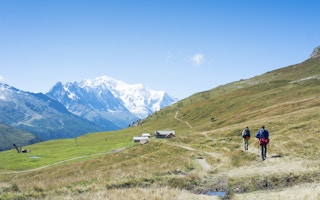With a reputation in Australia for public drunkenness and antisocial behaviour, backpackers might not seem likely role models for “greener” ways of living. Most backpackers are from upper- or middle-class backgrounds where high consumption is the norm. Surely those patterns of high resource use will continue on holiday?
In fact, backpackers provide interesting insights into how people can act in more sustainable ways. Recent research reveals the many ways backpackers act sustainably – often without meaning to.
This research reveals sustainable actions on environmental issues such as reducing resource consumption and waste. It shows how backpackers can help improve our economic sustainability, for example by filling labour shortages or spending money in ways that benefit local communities.
It also highlights socially sustainable actions performed by backpackers, who act in ways that show respect for local communities.
So here are seven sustainability lessons we can learn from backpackers.
1. They carpool regularly
Backpackers are into carpooling because it lets them achieve two of their goals – saving money and having new experiences. Scroll through any car-sharing forum – it might be gumtree.com.au, coseats.com or couchsurfing.org, for example – and you will find backpackers. Hostels all over Australia have noticeboards filled with ride-share requests.
Websites such as relocations2go.com.au and apollocamper.com list cars and camper vans that need to be relocated across the country. Some of these relocations require driving very long distances – from Alice Springs to Cairns, say, or from Adelaide to Darwin – but backpackers are happy to do it.
So rather than taking domestic flights, which are expensive, three or four backpackers will come together to buy a car or relocate a camper van. This helps to keep down the greenhouse gas emissions associated with their holiday.
It also forces them to drive through some fairly remote areas of Australia, places that don’t see a lot of visitors. Backpackers still need to purchase petrol, food and accommodation in these places, which provides a small boost to local economies.
While each backpacker’s spending is quite low, the combined effect of their small purchases is significant. When backpackers arrive in their destination they drop off the camper van or sell their car to other backpackers looking to do the return journey, and the process repeats.
2. They don’t waste food
It has been reported that the average Australian wastes 200 kg of food per year. All of the water needed to grow this food as well as the petrol used for harvesting, processing and transport is then also wasted.
But not so in backpacker hostels, where “free food” shelves are a common sight. Each hostel usually has one in the kitchen and one in the fridge. So when backpackers leave the hostel they (or hostel staff) put their leftover food on these shelves. As backpackers are on a tight budget, scouring the free food shelves is an easy way to save.
3. They’re not acquisitive
The amount of possessions backpackers can carry is strictly limited. They are forced to live for long periods carrying only what they can fit on their backs (or, increasingly, in their trolley cases). A backpacking holiday is a good way to learn that life without a lot of stuff isn’t so bad.
As over-consumption drives so many unsustainable practises, voluntarily reducing consumption and standards of living, as backpackers do, is potentially transformative.
4. They know how to share
“
While backpacking is not for everyone, it indicates that it is possible for sustainable practices to be integrated into people’s everyday lives with minimal effort and cost.
Long before the “sharing economy” became a globally recognised phenomenon, backpackers were regularly sharing kitchen facilities, food, bedrooms and cars.
Across Australia’s backpacking circuit, four beds to a room are considered spacious. Kitchens will have one or two stoves in hostels that accommodate dozens of people. Dorm rooms have one light and one ceiling fan and each hostel, no matter the size, will have one television.
When resources are shared like they are among backpackers, consumption goes down, greenhouse gas emissions are lowered and less waste is produced. Living in less space has been advocated by the “tiny house” movement as an affordable and environmentally sustainable housing option, but backpackers do it automatically.
5. They trust each other
Having to share bedrooms and kitchens and driving halfway across Australia with a bunch of people you’ve just met might seem daunting, but for backpackers it’s tolerated (even enjoyed) as part of the experience.
But what really makes it a functional arrangement is trust. Backpackers have to be able to trust the other backpackers they’re living with – people they have only just met – not to harm them in any way. Mutual trust provides social benefits because it helps keep a community together, and backpacking couldn’t function without it.
6. They want to respect cultural differences
While backpackers have a reputation in Australia for loutish behaviour, it is important to look beyond the stereotype. Many backpackers to Australia want to demonstrate cultural respect. This was one way they could carry out socially sustainable actions.
In fact, backpackers in central Australia commonly chose not to climb Uluru upon learning it is against the law of the Anangu, the traditional owners. This is a way backpackers can actively demonstrate cultural respect and understanding.
7. They’re happy without luxuries
Backpackers don’t need to shower every day and they are happy washing their clothes by hand. The cooking utensils, kitchen facilities and bedding at many hostels in Australia are in various states of disrepair – but it doesn’t bother backpackers.
This is sustainable because it prolongs the life of these items. By not having to regularly replace kitchen and bedding products, hostels are able to reduce waste, greenhouse gas emissions and water consumption associated with the manufacturing, transport and disposal of these items.
So… should we all just become backpackers?
Well – probably not. At a global level, backpacking, like tourism in general, is unsustainable as it depends on long-haul flights and wealth discrepancies between developed and developing countries.
However at the local level, unlike other forms of tourism, backpacking provides many opportunities for the performance of sustainable practises and it is here that we can learn from backpackers.
While backpacking is not for everyone, it indicates that it is possible for sustainable practices to be integrated into people’s everyday lives with minimal effort and cost. It also shows how people used to highly consumptive lifestyles can act sustainably – even without knowledge of sustainability.
![]()
Benjamin Iaquinto is a PhD student at the University of Melbourne. Kathryn Williams is associate professor in environmental psychology and director, Office for Environmental Programs at University of Melbourne. This article was originally published on The Conversation.











